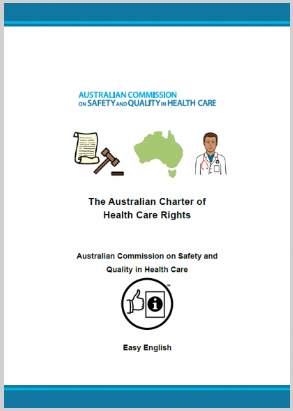The Australian Charter of Healthcare Rights explains the rights that apply to all people in all healthcare settings. The Charter describes what you, or someone you care for, can expect when receiving health care. The Charter outlines what every person can expect when receiving care and describes seven fundamental rights including:
- Access – You have the right to get care that meets your needs.
- Safety – You have the right to get safe health care.
- Respect – You have the right to get respect when you are at a health service.
- Partnership – You have the right to partner with your health care provider.
- Information – You have the right to get information about your health, see information about you and get help to understand information about your health.
- Privacy – Health care providers must respect your privacy.
- Giving feedback – You have the right to give feedback.
It is important that people have access to their rights when they are at Eastern Health. Please ask a staff member for more information or you can access full details of the Australian Charter of Health Care Rights, including an easy English version, translations of the Charter into 19 community languages and video and digital resources on the Safety and Quality website.
Children and Young People’s Rights in Healthcare Services Charter
Eastern Health respects that every child has the right to access health services without any discrimination. As a subscriber to the Children and Young People’s Rights in Healthcare Services Charter, we endeavor to ensure that every child and young person has the right:
- To consideration of their best interests as the primary concern of all involved in his or her care.
- To express their views, and to be heard and taken seriously.
- To the highest attainable standard of healthcare.
- To respect for themselves as a whole person, as well as respect for their family and the family’s individual characteristics, beliefs, culture and contexts.
- To be nurtured by their parents and family, and to have family relationships supported by the service in which the child or young person is receiving healthcare.
- To information, in a form that is understandable to them.
- To participate in decision-making and, as appropriate to their capabilities, to make decisions about their care.
- To be kept safe from all forms of harm.
- To have their privacy respected.
- To participate in education, play, creative activities and recreation, even if this is difficult due to their illness or disability.
- To continuity of healthcare, including well-planned care that takes them beyond and paediatric context.

